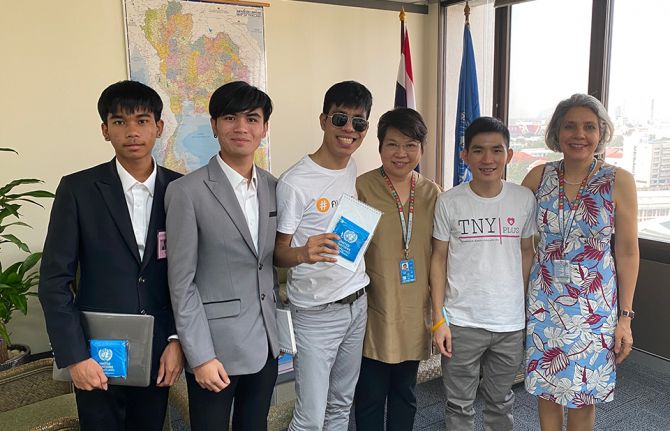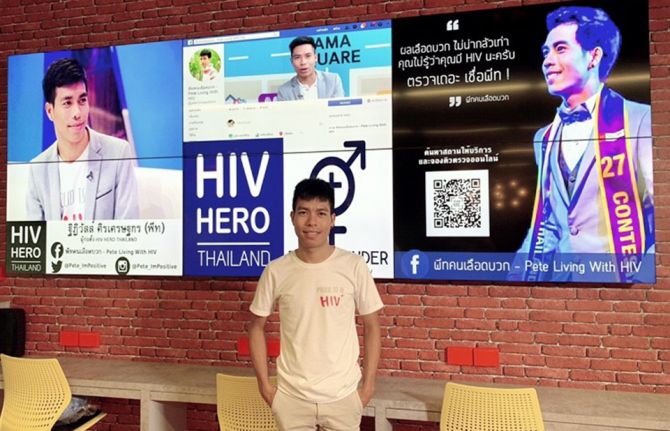



Feature Story
“My life’s mission is to end stigma and discrimination, and that starts with U = U”: a story of HIV activism in Thailand
01 March 2022
01 March 2022 01 March 2022Like any other regular day in Bangkok, Thailand, Pete went to work and was living a pretty normal life. He had a business that imported and exported fresh vegetables from neighbouring countries in South-East Asia, a family business that he shared with his sister. He was happy and in a serious long-term relationship with his boyfriend, and everything seemed perfect. That day, he and his partner went to get tested for HIV, and that’s when his life suddenly began to change.
“I found out about my HIV status in 2016 and soon after left my business because I didn’t know if I was going to live much longer. Without guidance and mental health support, I had many misconceptions about HIV, and I started to suffer from depression,” he said.
“I blamed myself for contracting HIV, and I couldn’t cope with this thought. I became a drug user, was engaging in chem sex, broke up with my partner and survived suicide attempts,” he continued. “But after receiving support from local organizations of people living with HIV, I decided to retake control of my life. I started to talk openly about HIV to help other young people live with a positive diagnosis. Even though this was never my plan, I knew I had to do it. That’s why I became an HIV activist,” he added.
Nowadays, Pete (famously known online as Pete Living with HIV) is a well-known HIV activist in Thailand and has come far since his diagnosis. He has spent the past few years building an online community for people living with HIV. In this safe space, people can connect and be comfortable enough to share their stories and experiences in an open environment free from stigma and discrimination. His Facebook group, which has strict membership requirements (for obvious reasons), has more than 1300 members.
“I created this space because I didn’t have a place to share my story. I wanted to create a platform where people living with HIV can be proud of themselves and be reminded they are not alone. No one deserves to be stigmatized, bullied, dehumanized or disrespected. Everyone deserves to be loved, respected and accepted,” he said.
In 2019, the country announced the Thailand Partnership for Zero Discrimination, which calls for intensified collaboration between the government and civil society to work on stigma and discrimination beyond health-care settings, including workplaces, the education system and the legal and justice system. UNAIDS has been involved since the outset of the initiative by providing technical assistance to formulate the zero discrimination strategy and the five-year action plan, develop a monitoring and evaluation plan and operationalize the strategy as a joint effort between the government and civil society.
Pete thinks this initiative is a cornerstone to ending the AIDS epidemic, as stigma and discrimination continues to be the main barrier to HIV services. “Although it has improved a lot over the years, I still experience stigma and discrimination when I go for regular sexually transmitted infection check-ups. I still receive judgement from nurses and doctors,” he said.
Pete has also become a passionate activist for, and speaks about the importance of, U = U (undetectable = untransmittable) at international forums and conferences. “U = U changed my life. I continue to fight for and promote U = U because its messages have the power to change the lives of people living with and affected by HIV. Still, more importantly, it can change social attitudes and tackle stigma and discrimination,” he said.
With U = U, HIV treatment has transformed the HIV prevention landscape. The message is clear and life-changing: by being on HIV treatment and having an undetectable viral load, people living with HIV cannot transmit HIV to their partners. The awareness that they can no longer transmit HIV sexually can provide people living with HIV with confidence and a strong sense of agency in their approach to new or existing relationships.
Pete launched a campaign in 2020 focusing on U = U and mental health advocacy. “Through my social media channels, I raise awareness about the importance of listening to people and their experiences and respecting them. U = U is key to helping people living with HIV overcome self-stigma and negative feelings like shame, which discourage them from accessing and/or remaining on treatment. U = U is encouraging; it can help remind people living with HIV to be proud of themselves,” he said.
Pete is now strengthening partnerships with national stakeholders and allies of the HIV response to ensure that messages related to U = U, HIV prevention and zero discrimination are amplified and reach different audiences. He is also a representative on a multisectoral task force to design and implement the People Living with HIV Stigma Index in Thailand, which will be conducted this year. He has supported the United Nations in Thailand on various campaigns, including the Everybody Deserves Love Valentine's Day campaign and the zero discrimination campaign, in which he is engaging young people from across Thailand.



